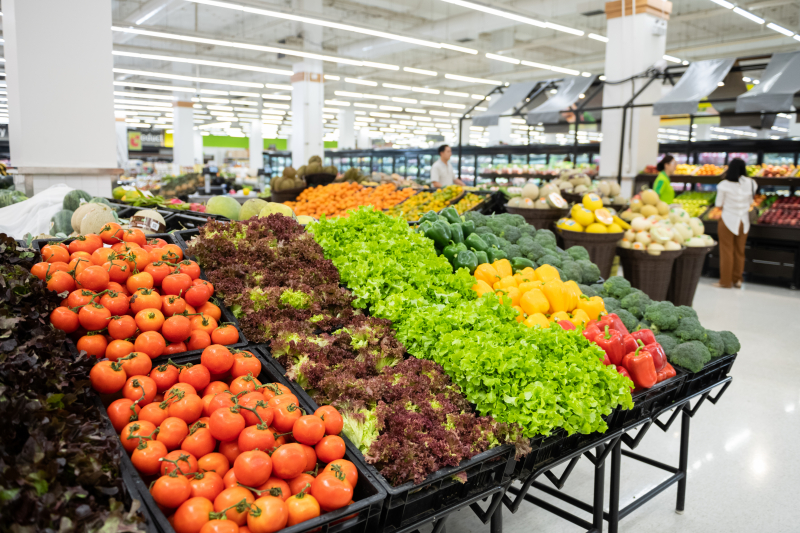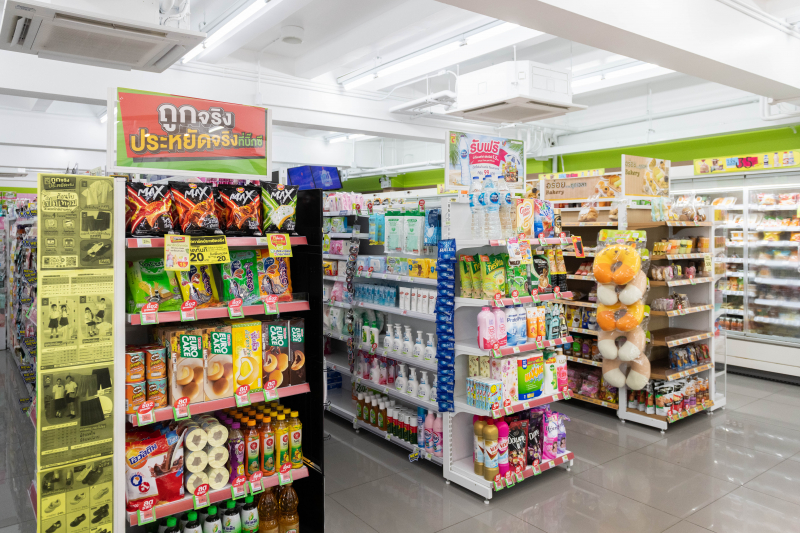
test

2 End hunger, achieve food security and improved nutrition and promote sustainable agriculture

goal 3

goal 4

goal 5

goal 6

goal 7

goal 8

goal 9

goal 10

goal 11

goal 12

goal 13

goal 14

goal 15

Goal 16
16.3: Promote the rules of law and the national and international levels and ensure equal access to justice for all.
16.5: Substantially reduce corruption and bribery in all their forms
16.7 Ensure responsive, inclusive, participatory and representative decision-making at all levels
16.b: Promote and enforce non-discriminatory laws and policies for sustainable development

Goal 17
Product Quality & Safety
Product Quality and Safety Management Strategy
Over the years, BJC has constantly been driven towards the mission to serve customers’ personal needs based on customer-centric and data-driven culture, accommodating to the needs of changing modern consumers, whom are demanding greater convenience, and are accustomed to greater alertness towards the importance of product safety and quality, demonstrated through increase desire for better product safety & quality, including taste, presentation, certifications, durability, freshness, nutrition, and varieties, paralleled with the provision of all appropriate product labelling as required by applicable laws. As such, the topic of product safety & quality has always been of great importance to BJC. This prioritization of the topic is further enforced as BJC is well-aware of the actual and potential, negatives and positive impacts on the economy, environment, and people, including impact on their human rights to quality of life and health, and adequate food, should BJC lack appropriate controls to product safety & quality, which may be presented in the form of increased health and safety risks for consumers, lower consumer trusts and interest in BJC’s products and services, increase safety violation cases amongst consumers, leading to increase legal costs and ultimately loss of revenue and reputations. On the other hand, a well-managed product safety and quality may lead to increased innovation, reduced environmental impacts from minimal utilization of hazardous chemicals, reduced waste generations and energy consumption, improving the overall health and quality of farmers and consumers.
Through BJC’s operation of the various supply chains, BJC is directly impacted by the forementioned negative impacts, which are in direct violations to BJC’s prioritization to product safety and quality goals, as BJC is committed to provide all customers and consumers with the highest quality of products and services beyond customer expectations. Through both own operations and relations with business partners, BJC can mitigate these issues through strict compliance with national and international product safety & quality standards applicable to each supply chains and beyond, to safeguard product safety & quality accordingly, protecting the safety of all consumers.

Product Quality and Safety Management Approach
On account of the diverse nature of each of the five core supply chains, all operations strictly adhere to a corporatewide Product Quality and Safety Policy, developed by the centralized Sustainability and Risk Management Department, which are customized to meet the requirements of each business units and oversee by the Quality Assurance Department at each facility. Compliance to the policy safeguards BJC’s operations from risk of violating legal requirements, and enforces operations to continuously identify, develop and initiate appropriate product safety and quality control mechanism to maintain BJC’s high safety and quality standards.
Product Quality and Safety Process
In order to offer products at their best quality and safety to customers, BJC develops the Product Quality and Safety Process, comprising four major phrases which are Quality and Safety Sourcing, Quality and Safety Production, Quality and Safety Control and Inspection Process and Grievance Mechanisms. The process is applicable to all of BJC’s five core supply chains.
 |
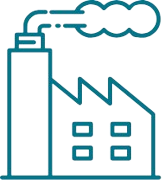 |
 |
 |
|
1 |
2 |
3 |
4 |
|
Quality and Safety Sourcing |
Quality and Safety Production |
Quality and Safety Control and Inspection Process |
Grievance Mechanisms |
|
BJC sources raw matenals from high quality suppliers, complying with industry best practices, ensuring the quality and safety of finished products and services. while enhancing the health and nutrition content. This is achieved through strict production standards control through colabonitions with relevant stakeholders throughout the value chain. |
To further support this commitment, BIC has implemented robust quality assurance processes designed to prevent or address defective products before they reach customers. These processes include:
|
All products and services produced by BJC, Big C, or our subsidiaries are subject to rigorous quality and safety controls throughout the entire value chain from upstream processes to end consumers. Comprehensive quality and safety inspections are carried out to ensure the consistency and reliability of all finished products and services. BJC’s manufacturing operations are fully aligned with the ISO 9001 Quality Management System, along with other applicable standards related to product quality. |
In case that stakeholders find any breach of product quality and safety in BJC's products and services, the company have provided various channels to receive feedblack |
Definition of Safety & Quality at BJC
At BJC, safety and quality are defined as the comprehensive and cumulative characteristics of a product that enable it to consistently meet or exceed the specific requirements and expectations of customers and end users. All BJC products must be safe for consumers and users when used as intended or under reasonably foreseeable conditions. These attributes encompass not only the product’s core functionality, performance, and reliability but also its alignment with the value perceived by the customer, while ensuring conformity with relevant regulatory, statutory, and industry standards. Product safety and quality at BJC are achieved through systematic processes that promote consistency, traceability, and control throughout the product lifecycle.
BJC upholds the principles of the International Organization for Standardization’s ISO 9001 Quality Management System (QMS) as a fundamental framework for managing and assuring quality. ISO 9001 promotes a process-based approach, emphasizing risk-based thinking, continual improvement, and a strong commitment to customer satisfaction. Compliance with ISO 9001 reflects BJC’s dedication to operational excellence and the delivery of products that are reliable, fit for purpose, and aligned with international standards.
Equally integral to our definition is the assurance of product safety, which requires rigorous risk assessments, adherence to applicable product safety regulations, and the incorporation of preventive design measures to eliminate or mitigate potential hazards. Product safety is paramount in preserving the health, well-being, and trust of our customers and stakeholders.
In summary, the attributes of functional performance, regulatory compliance, customer satisfaction, and user safety collectively define the standards by which BJC evaluates and delivers product quality. These principles guide our continuous pursuit of excellence and reflect our unwavering commitment to the well-being of our customers and the integrity of our brand.
1. Sourcing Quality and Safety
BJC uphold high quality and safety standards of its finished products and services through strict adherence with the product safety and quality culture, fostered through strict compliance with applicable laws, regulations and standards related to quality and safety. These includes Good Manufacturing Practices (GMP), Hazard Analysis and Critical Control Points (HACCP), Customs-Trade Partnership Against Terrorism (C-TPAT) and the International Organization of Standardization Quality Management System (ISO 9001) to name a few.
In addition, to ensure safe and quality products, BJC emphasize sourcing of raw materials from suppliers whom are carefully screened through the sustainability supplier selection procedure, confirming that raw materials are produced with sustainability considerations. Beyond this, all critical tier-1 suppliers are annually trained on BJC’s safety and quality assurance standards, fostering a standardized product safety and quality throughout BJC.
Example of Sourcing Quality and Safety Practices
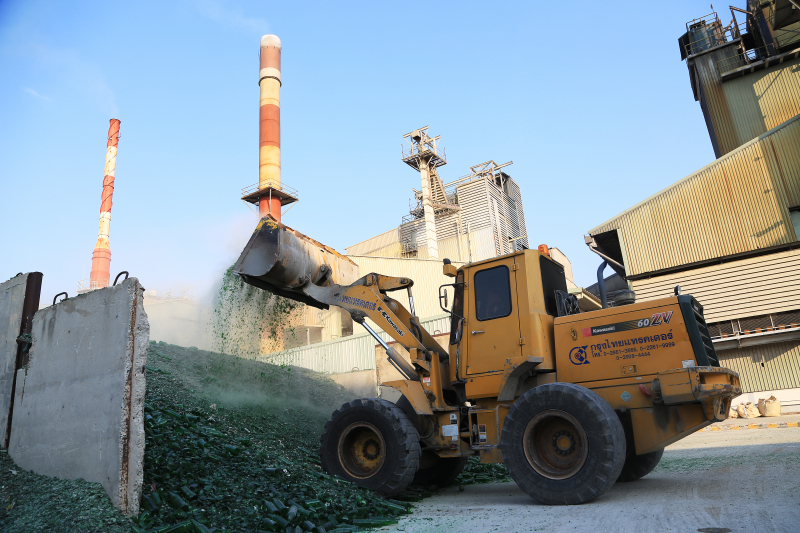
Sourcing Quality
This approach continues to be adopted by both Thai Glass Industries PLC (TGI) and Thai Malaya Glass Co., Ltd. (TMG). Beyond sourcing raw materials from selected suppliers who meet the supplier screening criteria, the raw materials are also subjected to component analysis to ensure compliance with the Glass and Raw Material Technology Department.

Sustainable Agriculture at Berli Jucker Food (BJF)
To ensure the quality and safety of its raw material sourcing, Berli Jucker Food Ltd. (BJF) actively supports Thai farmers in adopting sustainable agricultural practices. This support enhances their capabilities and status as quality suppliers. For example, BJF works with potato farmers in Northern Thailand by introducing and encouraging the adoption of Good Agricultural Practices (GAP). These practices include criteria such as water safety, site safety and sanitation, limited use of agrochemicals, data recording, biocontrol, quality management, and proper harvesting and post-harvesting handling. GAP aims to ensure raw materials meet safety standards while minimizing negative environmental impacts. Approved raw materials then undergo further testing to confirm they are free from contaminants before being used in production according to the international standards previously mentioned. Once production is complete, finished goods undergo quality assurance and quality control procedures, which are tailored in both process and frequency to the nature of each product.
|
|
|
Safety product @ Big C Big
Products are the core of Big C’s business, serving as the primary factor that builds consumer trust and meets their needs. When bringing products to market, it is essential to prioritize customer safety while genuinely addressing market demands. Furthermore, selecting products with recognized standards is of utmost importance. Products must be of high quality and certified by relevant standards such as the FDA mark (Food and Drug Administration), GMP (Good Manufacturing Practices), or HACCP (Hazard Analysis and Critical Control Points) to guarantee quality, reliability, and safety. By emphasizing value, differentiation, and quality standards, the products offered by Big C are well-positioned to effectively and sustainably meet consumer needs.
2. Producing Quality and Safety
Following the acquisition of safe and high-quality raw materials, each respective supply chain processes these materials in accordance with the product safety and quality requirements applicable to that specific supply chain.
Throughout the reporting period, both TGI and TMG have continued to implement the 5S Management Philosophy, which consists of Sort, Set in Order, Shine, Standardize, and Sustain, across their factories, shops, and offices. This practice enhances food safety by eliminating unnecessary items in the workplace, improving operational procedures, and preventing potential contamination during production that could pose risks to consumer health. In addition, all operations across BJC’s business units undergo annual external audits to ensure product safety and quality. These audits are conducted in compliance with international standards, including :
|
Standards |
Business |
Product |
|
ISO 9001:2015 (Quality Management System: QMS). |
Consumer/ Packaging/ Technical and Engineering |
Food/ Tissue paper/ Personal care/ Glass packaging/ Aluminum can |
|
ISO 22000:2018 (Food Safety System Certification: FSSC 22000) |
Packaging/ Other |
Food/ Glass packaging/ Coffee |
|
Good Manufacturing Practice (GMP) |
Consumer/ Retail |
Food/ Personal care/ Private label food products |
|
Good Hygiene Practices (GHPs) |
Packaging |
Glass packaging |
|
Hazard Analysis and Critical Control Point (HACCP) |
Consumer/ Packaging |
Food/ Personal care/ Glass packaging |
|
Other such as dermatologist-approved, Organic certificated |
Consumer |
Personal care/ Food |
►ISO 9001:2015 (Quality Management System : QMS)
3. Controlling and Inspecting Quality and Safety
Succeeding to the manufacturing process, finished goods are required to go through careful safety and quality inspections, to affirm all consumers to the high safety and quality standards. These processes include:
-
Internal Audits of the Quality Management System: All stages of production undergo rigorous inspections conducted by the Quality Management Division, using advanced testing methods and automated quality checkpoints to detect any deviations from product specifications. Internal audits are conducted to assess products that do not meet standards, including both packaging and product quality.
-
Root Cause Analysis & Continuous Improvement: Upon identification of a defect, a timely root cause analysis shall be conducted, followed by the implementation of appropriate corrective actions to prevent recurrence. In cases where a defect results in a product failing to meet the established standards, a formal defect report must be prepared. This report serves as the foundation for root cause analysis and informs the development and execution of corrective actions to ensure non-repetition of the issue.
-
Pre-Delivery Audits: Potential defects are identified early in the process through pre-delivery testing and inspections. Before shipment, comprehensive audits and batch reviews are conducted to ensure that only compliant products leave our facilities. These measures help prevent or address defective products before delivering them to customers to avoid product recalls, thereby maintaining product integrity and customer satisfaction.
-
Employee Training & Engagement: All internal stakeholders receive regular training on their roles and responsibilities within the quality management system to ensure consistency and accountability across all operations.
These proactive measures help BIC minimize the risk of defective products reaching the market and significantly reduce the likelihood of product recalls, thereby upholding our brand’s reputation for safety, reliability, and excellence.
4. Corrective Action Plans & Grievance Mechanism
Beyond the sourcing, producing, and controlling of product safety and quality, BJC also remains devoted to amend all identified negative impacts and violations, subsequent to relevant onsite inspections and assessments, conducted by both internal and external auditors.
Audit results are used to identify suppliers whom have not met and/or are in violation of the agreed safety and quality standards, to manage according to the company policy as follow.
- BJC evaluates the severity of the violations and determine the length of corrective period and collaborate with the supplier, provide consultation assistance to improve process.
- BJC integrates the views and opinions of relevant stakeholders, collected through various channels such as customer service hotlines, dedicated email addresses, online forms, social media, or third-party platforms, into its improvement process.
- Customer feedback integration enable prevention of future occurrence of the same/similar issues. Effectiveness of implemented remediated initiatives are regularly monitored through customer feedback.
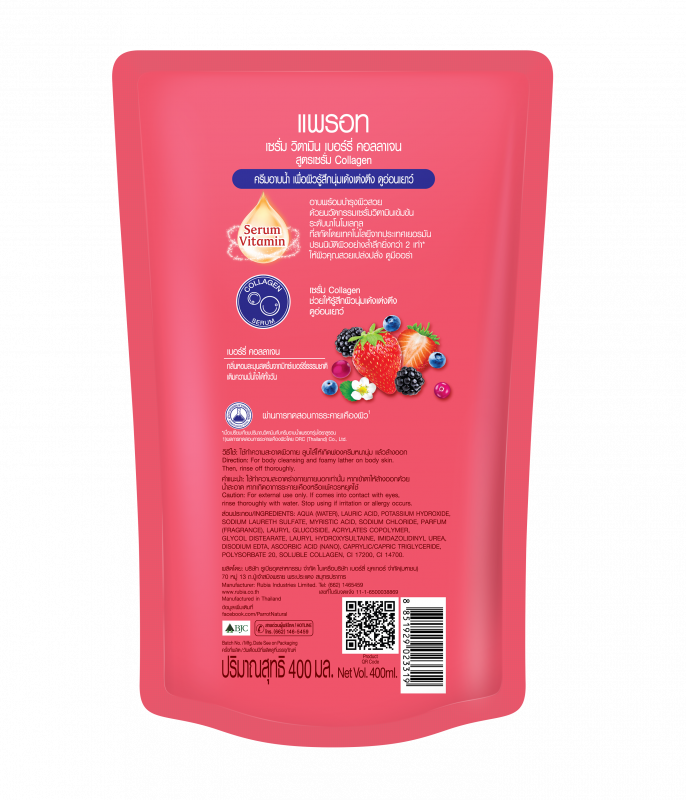
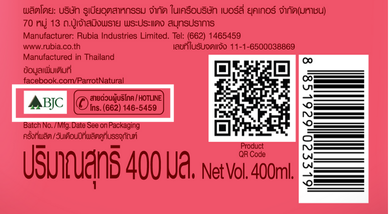
BJC is a leading entity in the Retail and Food Staples Retailing sector, with a broad scope of business operations encompassing modern retail, packaging manufacturing, consumer product manufacturing, as well as healthcare and technical services. The company’s private label products are primarily developed and produced by its packaging and consumer product divisions. Key product categories include glass bottles, aluminum cans, Cellox facial tissues and toilet paper, Zilk toilet paper, Maxmo multi-purpose paper, Tasto potato chips, Dozo rice crackers, Party and Campus extruded snacks, Parrot soap, and DMP baby soap. Between 2021 and 2024, BJC did not receive any product recall notices, thereby resulting in zero product units being recalled during this period.
Furthermore, during the same period, there were no reported violations of laws administered by relevant regulatory agencies that would warrant legal action against the company. BJC remained in compliance with applicable consumer protection, product safety, labeling, and manufacturing standards. No enforcement actions, such as fines, penalties, or litigation, were initiated by government agencies in relation to the company's products or operations.
|
|
2021 |
2022 |
2023 |
2024 |
|
Number of recalls issued |
0 |
0 |
0 |
0 |
|
Quantity of products recalled |
0 |
0 |
0 |
0 |
